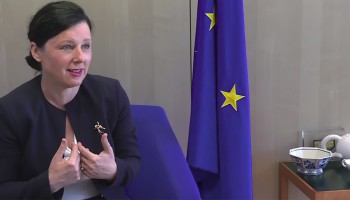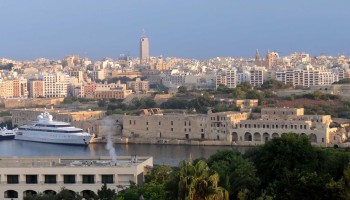“If there were a family of entrepreneurs characterized by its passion, professionalism, commitment, creativity, international influence, philanthropy, thirst for optimism and the search for excellence in the business world and with governments, Albert Karaziwan would definitely be a part of it.”
So begins a gushing blog dedicated to Karaziwan and the company he runs, Semlex, a Belgian biometric document-maker that has left a trail of corruption and arms-trading scandals across Africa over the course of nearly two decades.
Key to its success has been Karaziwan himself, whose charm, political savvy, and high-level contacts have seen him build a business spanning five continents and a property portfolio worth tens of millions of euros.
In Belgium, Karaziwan has made contacts in high places, rubbing shoulders with top politicians, influential businessmen, and nobility in exclusive networking clubs such as the Cercle de Lorraine. For years these contacts helped him to project an image of upright entrepreneurism that still remains untarnished by criminal charges, despite a litany of accusations made against him and his company.
In 2003, Semlex wrote to Princess Astrid of Belgium asking for her support to buy medical equipment for a maternity clinic in Chad — the first African country where the company won a biometric contract and where Karaziwan got one of his employees to hack into the government’s computer network.
Six years later — as Semlex was expanding its reach in Africa through bribes and shady deals — Karaziwan co-founded the Belgian branch of Optimists Without Borders, an international club that aims "to initiate a cultural revolution based on a commitment to be optimistic," along with several ambassadors, wealthy businessmen, and politicians. He even provided one of his mansions as the headquarters of the club.
Leaked documents obtained by OCCRP and Belgian magazine Médor show how Karaziwan charmed the people he needed, buying them everything from expensive cars to a luxury Parisian flat. Intelligence reports and interviews indicate Karaziwan was also in contact with multiple government security agencies, some of whom he fed inside information on African leaders.
Friends and business associates of the Semlex CEO who spoke confidentially to reporters described a man who could adapt to any audience, hiding his wealth or flaunting it as the situation required.
"He was always charismatic,” said a former Semlex employee, who didn’t want to be named for fear of jeopardizing his career. “He couldn't go somewhere without being noticed, that’s the feeling that emanates from him."
The Semlex CEO has used the profits of his success to help build a collection of properties worth more than 30 million euros ($36.4 million), including over a dozen in Brussels, two castles in Belgium, and at least one chateau in the south of France.
Belgian prosecutors have opened multiple investigations into Karaziwan and Semlex, but nothing has come of them. A spokesperson for the Federal Public Prosecutor’s Office, Eric Van Duyse, said police are investigating the company for corruption, but declined to elaborate further.
Karaziwan and Semlex did not respond to multiple requests for comment.
Contacts and Contracts
Karaziwan was born in 1958 in Aleppo, Syria, one of eight children. As a boy he was “bright and willing to learn,” according to a now-defunct blog produced by Semlex. In 1980 he went to study in Belgium, where he “quickly stood out from the others because of his pugnacity.”
After starting out in the diamond business in Antwerp, he made his fortune by helping a Finnish businessman invest in Brussels real estate. In 1992 he founded Semlex in the Belgian capital, before opening a branch in Dublin six years later.
From the early 2000s, Semlex won dozens of contracts to make biometric documents for governments around the world, as well the United Nations, European Union, and international police agencies. The blog dedicated to Semlex, which appears to have been written by Karaziwan himself, boasts that he “maintains privileged relationships with the authorities in the countries with which he works,” including police, immigration, and defense services.
“He can make you feel that you are very important to him, whoever you are.”
A longtime acquaintance of Albert Karaziwan
Friends and business associates described him as “amicable” and “approachable.” “He can make you feel that you are very important to him, whoever you are,” said one longtime acquaintance.
Karaziwan has often leveraged his political contacts to win business. In 2006, for example, he traveled to Syria with Belgium’s controversial former Secretary of State Pierre Chevalier. He also appears to have met with the ambassador of Tajikistan in 2010 along with another of his political contacts, ex-senator Stef Goris, who was later expelled from the Council of Europe over accusations he took bribes from Azerbaijan.
According to a report by the Belgian security services, Karaziwan also accompanied “African leaders to New York to obtain contracts subsidized by the UN for the development of identity cards in the African countries.”
In at least one country, Karaziwan used his business to gain political power of his own.
In the East African archipelago of Comoros, he was appointed as a special advisor to the president, made a roving ambassador, and granted a diplomatic passport. Over the years at least eight of his staff were given honorary consulships for the country, and sent everywhere from Mombasa to Monaco, according to Reuters.
As the Arab Spring whipped through the Middle East in December 2010, Karaziwan told Belgian intelligence he had received calls from “an influential member of the Saudi royal family” seeking Comorian passports for himself and his relatives under false names.
Throughout, the Semlex CEO has presented himself as a pillar of law and order. Even the name Semlex, the company has said, derives from the Latin for “the meaning of the law.”
“By helping the authorities better identify people and to guarantee the authenticity of official documents such as passports and visas, Mr. Karaziwan is fighting against crime,” says the blog.
But OCCRP’s reporting shows Semlex has been embroiled in multiple corruption, bribery, and even arms-dealing scandals across Africa. And leaked Belgian intelligence reports hint Karaziwan may have also been providing information on criminal activities to multiple different security services.
One note from 2011, describing a dinner between Karaziwan and a Belgian agent, said he “admits having had contacts with the DGSE [France’s Directorate-General for External Security] in the context of his relations with African leaders as well as with the [U.S.] ‘Secret Service’ in the fight against the trafficking of counterfeit dollars.”
Another from the following year added that Karaziwan “has been the subject of numerous reports showing his contact with the Syrian services, but also the Libyans.”
The U.S. Department of Homeland Security, which heads up the Secret Service, did not respond to a request for comment. France’s Ministère des Armées, which oversees the DGSE, also did not respond to a request for comment. Reporters were not able to reach Libyan and Syrian security services.
Push into Africa
Karaziwan put his playbook to work most effectively in Africa, where Semlex claims it has won contracts in 20 countries. An internal email obtained by OCCRP shows employees saw the continent as an easier market than other parts of the world.
“It is such a difference working with Latin Americans compared to Africans," wrote Semlex manager Christine Pape in 2004. "They [Latin Americans] know what they want and they are very demanding. Therefore, the work is more challenging.”
Karaziwan’s long-term acquaintance described how he would flaunt his wealth to impress people as needed when on the continent.
“When he meets officials in Africa he will come with a very big Mercedes because he knows Africans are very sensitive to appearance,” he explained, adding that Karaziwan owns as many as 30 collector’s cars. “But when you meet him in Europe, you won't even notice him.”
Semlex pioneered its prolific use of political fixers in Chad, which appears to be one of the first African countries where it won biometric contracts. Starting in 2001, the company won at least 40 million euros’ worth of contracts there, according to emails seen by reporters. There its people worked with an adviser to President Idriss Déby named Abderrahman Moussa, whom a U.S. diplomatic cable described as an “insider's insider" with decades of service in the country’s political and military circles.
Semlex also paid 1.8 million euros ($2.2 million) to a company controlled by Déby’s ex-wife, Zina Idriss, and set up contracts with both her and their son, Douga, between 2008 and 2010.
Irish Secrecy
Sometimes Semlex’s CEO used gifts and favors to curry up business.
In leaked emails, he discussed winning business in Mozambique with his fixer and in the same breath, importing SUVs worth tens of thousands of dollars.
Swiss court documents from 2018 allege that one of Karaziwan’s companies even helped buy a property in Paris worth over 2 million euros ($2.4 million) for the son of Republic of Congo President Denis Sassou Nguesso.
Documents show Semlex and Karaziwan owned the apartment through a company called Daruneva in 2010. Soon after, Semlex transferred its shares in Daruneva to a representative of Sassou Nguesso. A Swiss justice report concluded: “It appears from a chain of emails that this acquisition would have been intended for Denis Christel Sassou Nguesso.”
A leaked email and a transaction record show the deal was financed by commodities giant Gunvor, which Semlex was helping to secure millions of dollars of discounted oil in the Republic of Congo at around that time.
A Gunvor spokesperson said the company had "zero knowledge of the real estate transactions described and has never participated in anything of the like.”
On other occasions, it seems, Karaziwan just used his charm. The former Semlex employee said his boss once tricked the Democratic Republic of Congo’s former president, Joseph Kabila, into believing Semlex’s database was working properly when it suffered a last-minute glitch moments before a crucial presentation in 2015.
“They tell you that the man can talk his way in or out of every situation," the source told OCCRP.
But Karaziwan also used more underhanded tactics to get an edge. In Chad, Semlex appears to have gone as far as spying on a government official to get information about a rival bidder when it seemed the company may lose out on a contract.
Semlex computer network administrator Ibrahima Sidy Konate wrote to his supervisor in early 2006 asking for a raise. He boasted that in just 10 days of living in Chad, he managed to learn “90 percent” of the government’s “IT methods and scripted procedures.”
Those techniques appear to have come in handy that summer, when Konate wrote to Karaziwan with a warning. "I found files that are talking about us,” he wrote on July 24. “I think you are the person who is most mentioned."
Konate also found a proposal by a Swiss company to replace Semlex in Chad, according to an email that Semlex agent Xavier Davard sent to Karaziwan four days later. But the proposal was “protected by a password that we were unable to crack," he said, before wishing success in “forcing the password."
In other countries, OCCRP’s reporting shows, Semlex went even further, paying bribes to a top official in Madagascar, and even working with Gunvor to try to help arm the pariah regime of ex-President Laurent Gbagbo in Ivory Coast.
Gunvor has denied all of the allegations. Last month, the commodities giant announced it would cut back on using intermediaries to win business.
Despite the multitude of accusations, Semlex has continued to win business in Africa. In November, the company’s Congolese subsidiary, Locosem, appeared to have won a new $68 million contract to produce passports for Congo’s government, despite having been involved in corruption scandals there, according to a preliminary document on the deal seen by OCCRP.
Property Portfolio
Over the years Karaziwan has built up a fortune, including a network of properties, castles, and chateaux in Belgium and France worth more than 30 million euros ($36.4 million).
Until this summer, property records show he owned dozens of buildings in and around Brussels, including in the exclusive suburb of Ter Kamerenbos.
AlbertKaraziwan.wordpress.com describes him as “passionate” about history, with a taste for historic buildings. Semlex has donated funds to restore Hougoumont farm near the location of Napoleon’s defeat in Waterloo. The company itself is headquartered in a restored Art Deco hotel in the Brussels region.
In 2012, one of Karaizwan’s companies, Parcomatic, bought the 17th century walled Chateau de Rivieren on the outskirts of Brussels for 20.5 million euros ($24.9 million) according to emails and property records.
Through another company, Karaziwan’s family owns the Chateau des Milles Fenêtres, meaning Castle of a Thousand Windows, in Leignon in the hilly south of Belgium.
Karaziwan bought another chateau in Domaine de Prémont, France, for 1.1 million euros.
In emails seen by OCCRP, he also discussed buying an apartment in Paris and selling a villa in Saint-Jean-Cap-Ferrat, near Nice on the southern coast, although reporters could not confirm whether those deals went through.
‘Answer for His Crimes’
Belgian prosecutors have opened multiple investigations into Semlex’s activities, but no one from the company has ever been publicly charged.
The first investigation appears to have been launched in 2012, when Karaziwan was questioned by police as part of a money-laundering probe along with his good friend, lawyer, and co-founder of Optimists Without Borders, Luc Simonet. But by the end of the year the case had been closed.
In 2018, police launched a fresh investigation into the company’s role in money laundering and corruption following revelations by Reuters that it had paid bribes to win business in Congo. Police raided Semlex’s offices in January that year.
Federal Prosecutor's Office Spokesperson Van Duyse confirmed Belgian police are investigating Semlex for corruption, but would not give more details.
This year, Congolese citizens and a coalition of international campaign groups also filed a civil complaint against the company in a Belgian court.
"We want Semlex to be prosecuted for corruption because they cheated the Congolese people by selling them the most expensive passports in the world," said Fred Bauma, a Congolese anti-corruption activist who is one of the petitioners.
"My feeling is that the Belgian government is protecting Karaziwan,” said Bauma. “They have a lot of evidence to open a case against him, and they're not doing anything."
Karaziwan still owns shares in at least five companies and serves on the board of Semlex.
Over the summer, Karaziwan ceded administrative control of seven additional Belgium-based firms to his children, as well as a French company, Domaine de Prémont, which owns the French castle. His profile on Semlex’s website has also been removed.
Karaziwan and Semlex did not respond to multiple requests for comment.
"African people will one day hold Karaziwan accountable for all the corruption he is responsible for,” Bauma said. “He can't have impunity forever — one day he will have to answer for his crimes."











